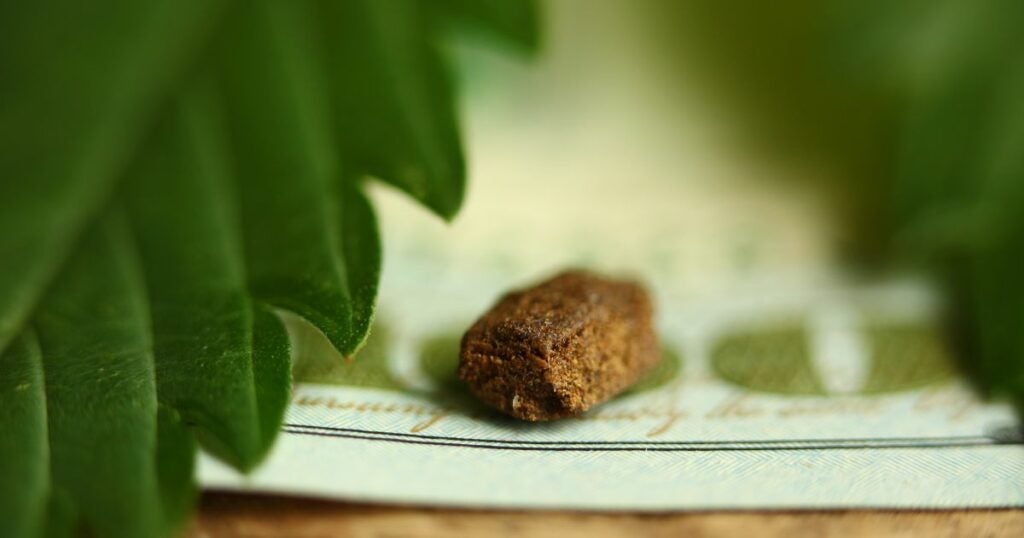- No Products In The Cart
- start shopping
What is Hashish? A Comprehensive Guide to Its Origins, Effects, and Consumption Methods

In this comprehensive guide, we’ll delve into the world of hashish, a concentrated form of cannabis with a rich history. We’ll discuss its origins, the methods used for cannabis production, various ways of consumption, and the short and long-term effects associated with hash use. Furthermore, we’ll compare it to marijuana and explore its legality in the United States and beyond.
Hashish Uncovered
Hashish is a potent form of cannabis made from the resinous glands of the cannabis plant called trichomes. These glands contain the active ingredients, including higher concentrations of THC (tetrahydrocannabinol), which contribute to the plant’s psychoactive properties. The final product typically has a dark brown colour and can vary in texture from sticky to crumbly.
A Journey Through Time: The History of Hashish
Hashish has been used for centuries in various cultures, particularly throughout the Middle East and Asia. In the early 20th century, it gained popularity in the United States and Europe, and its use has continued to grow since then.
Crafting Hashish: The Cannabis Production Process
To create hashish, the resinous trichomes are separated from the dried flowers of the cannabis plant. This can be done through various methods, such as rubbing, sifting, or using ice water and agitation. The collected trichomes are then pressed and heated to form a solid mass, which can vary in potency depending on the production method and quality of the cannabis used.
Ways to Enjoy Hashish
There are several methods for consuming hashish, each offering a unique experience. Some popular methods include:
- Smoking: The traditional method involves smoking on its own or mixed with tobacco or marijuana in a pipe, bong, or joint.
- Vaporizing: A modern approach involves heating hash to release the active compounds without combustion, providing a smoother inhalation experience.
- Ingesting: Hashish can be incorporated into various recipes, like brownies or cookies, for a longer-lasting effect.

The Impacts of Hashish: Short and Long-Term Effects
As with any substance, it’s essential to understand the potential side effects associated with hash use.
Short-Term Effects
Some common short-term effects of hash include:
- Euphoria and relaxation
- Enhanced sensory experiences
- Increased appetite
- Altered perception of time
- Dry mouth and red eyes
These effects may vary in intensity and duration depending on the individual and the concentration of THC in the hash consumed.
Long-Term Effects
Though research on the long-term effects of hashish is still ongoing, some potential concerns have been identified, such as:
- Respiratory issues, particularly for those who smoke it
- Impaired memory and cognitive function
- Increased risk of mental health issues
- Dependence or addiction
The Legality of Hashish
In Canada, cannabis is regulated under federal law, with specific guidelines for its possession, distribution, and consumption. Despite this, the legality of cannabis can differ significantly depending on provincial laws, so it is vital to have knowledge of the local regulations before using it.
In the United States, hashish is classified as a Schedule 1 drug under federal law, making it illegal at the federal level. However, the legality of hash varies greatly depending on individual state laws, so it’s essential to be familiar with local regulations before considering its use.
Hashish vs. Marijuana: A Comparison
While they are both derived from the cannabis plant, there are significant differences between hash and marijuana. Hash is made from the plant’s resinous trichomes and has a higher concentration of THC, making it more potent than marijuana. In contrast, marijuana refers to the dried flowers, leaves, and stems of the cannabis plant and contains a lower THC concentration. The methods of consumption and their effects can also vary between these two forms of cannabis.
Wrapping Up
Hashish, a concentrated form of cannabis with a long history, offers a more potent experience than marijuana due to its higher THC concentration. Produced from the resinous trichomes of the cannabis plant, it can be consumed in various ways, including smoking, vaporizing, and ingesting. Understanding the short and long-term effects of it, as well as its legality in your region, is crucial before choosing to use this substance.
Frequently Asked Questions (FAQs)
What is the main difference between hashish and marijuana?
Hashish and marijuana both come from the cannabis plant, but it is made from the resinous trichomes and contains a higher concentration of THC, making it more potent. In contrast, marijuana refers to the dried flowers, leaves, and stems of the cannabis plant and has a lower THC concentration.
Is hashish legal in the United States?
At the federal level, hashish is classified as a Schedule 1 drug and is illegal. However, the legality of hash varies depending on individual state laws. It’s essential to be familiar with local regulations before considering its use.
What are some common ways to consume hashish?
Hashish can be consumed in various ways, including smoking (in a pipe, bong, or joint), vaporizing, and ingesting (by incorporating it into recipes like brownies or cookies).
What are the short-term effects of using hashish?
Some common short-term effects of hash include euphoria, relaxation, enhanced sensory experiences, increased appetite, altered perception of time, dry mouth, and red eyes. These effects can vary in intensity and duration, depending on the individual and the concentration of THC in the hash consumed.
Are there any long-term effects associated with hashish use?
While research on the long-term effects of hashish is still ongoing, some potential concerns include respiratory issues (particularly for those who smoke it), impaired memory and cognitive function, increased risk of mental health issues, and dependence or addiction.
